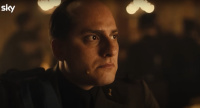When God Looked the Other Way
Wesley Adamczyk
In May of 1940, 25,000 Polish Army officers were led into the Katyn Forest in eastern Poland by their Red Army captors and executed. Adamczyk's father was one of them. In this finely wrought memoir of loss and survival, Adamczyk tells his family's story against the backdrop of a little known chapter of WWII-the forced exile of thousands of Poles by the Soviet government in the opening weeks of the war. Adamczyk's upper-middle-class family was taken at gunpoint and sent on a harrowing 3,000-mile journey to the barren wastes of Kazakhstan. Life in Stalin's U.S.S.R. was a horror-there was little food, clothing or shelter for the downtrodden natives, let alone for the refugees flooding the area. The family survived through the sheer will and constant ingenuity of the author's mother, who guided the family in an escape from the U.S.S.R. to British-occupied Iran and, exhausted from her efforts, died. Adamczyk's language is earthy, intense and moving. In addition to the strong portraits of his family, Adamczyk fills the book with unforgettable characters from their odyssey-brutal Red Army soldiers; desperately impoverished yet generous Kazakhs; and the clean, well-dressed Americans. With this work, Adamczyk has brought illumination and honor to the families of the thousands who suffered the same terrible fate. (June) Copyright 2004 Reed Business Information.I can think of no other European country, with an ancient history, whose inhabitants have been so victimized by its neighbors as Poland. Probably the worst of those neighbors was Russia, then ruled by Catherine the Great. Between 1772 and 1795, the entire territory of the Kingdom of Poland was divided among Prussia, Austria and Russia. Only during the short period when Napoleon ruled central Europe was Poland restored, though only as the Duchy of Warsaw, dependent on Napoleon himself. The 'duchy' consisted of the territories which Prussia and Austria had annexed in 1793-5.In the aftermath of World War I, the three empires -- Austrian, German and Russian -- that had once partitioned this tragic land were wiped out and thus the Republic of Poland was born, free at last. But the freedom had a short lifespan, some 10 years. A new, even bloodier partition was on the way.With the opening of World War II, Poland was once more in the eye of the hurricane. The country was invaded from the west by Nazi Germany and from the east for the second time by the Soviet Union (the first time having been in 1920, by V.I. Lenin). The two dictatorships then divided Poland and each began to persecute its inhabitants.The Nazis murdered about 90 percent of Polish Jews and more than 1 million Catholic Poles. The Soviets murdered a comparable number of Poles; many others were gulaged to Siberia. Joseph Stalin, like Russian monarchs before him, hated the Poles far more than he hated the Germans.At the end of World War II, new boundaries were designed for central Europe by Stalin, Winston Churchill and Franklin D. Roosevelt. It was at Yalta that, with a shrug of the shoulders, FDR and Churchill gave away to Stalin a third of Poland's pre-WWII territory.And then they gave away Poland itself. So what? In 1939, Britain's Neville Chamberlain gave away Czechoslovakia to a ravenous Adolf Hitler.This memoir by Wesley Adamczyk ('Wesley' being an Anglicized version of the Polish 'Wieslau') is a personal story of the horrors that Poles lived through during World War II. 'When God Looked the Other Way,' above all else, explains why there is still a Poland. Or in the words of the national anthem: 'Poland has not yet perished/ As long as we live . . .' Mr. Adamczyk's story is one of the most remarkable World War II sagas I have ever read. It is history with a human face, the dramatic tale of a remarkable woman: the invincible Anna, Mr. Adamczyk's mother and the wife of a Polish officer. Her husband, 47 years old, became one of Stalin's victims in the never-to-be-forgotten Katyn Massacre of 30,000 Polish officers. FDR and Churchill knew who killed those 30,000 Poles and why. They even secretly corresponded about Katyn, but publicly they said nothing, letting Stalin's lie -- that the Nazis had committed this crime -- go uncontradicted. With her three young children, Anna fled stricken Poland to Russia, which was then allied with Germany as part of the Soviet-Nazi non-aggression pact that helped precipitate World War II. The NKVD, as the Soviet secret police were then called, sent the four evacuees via cattle cars to Siberia and then to Kazakhstan. They were hounded by the NKVD until they found safe haven in Iran. As Mr. Adamczyk recalls: 'We arrived with little more than our unwelcome baggage of lice, bugs, and disease.' Dysentery, malaria, scarlet fever, mumps and measles afflicted the family at various times. One of those diseases finally killed Anna in 1942 at the age of 45. With no doctors or medicine during their ordeals, it was a miracle (called 'Anna') that the three children survived. Their wanderings are, of course, incidental to the great battles that were being fought in Stalingrad, Moscow and Berlin; but every life, in war or holocaust, has meaning. And the Adamcyzk family's story is the story of millions of Poles between 1939 and 1945 who were traduced by their supposed allies. The author writes of the war's end: '[W]e lost our home and country when the Communists deported us, then we lost it all again when the Allies, with whom the Poles had fought for a free world, sold us out to the Soviets. The war had been over for two years, yet Polish refugees the world over simply sat waiting for a miracle to happen. Now we are told we have two choices: go back to Poland and live under Communism or go to yet another foreign country and live with the people whose government has sold us out.' As for the Soviet Union, Stalin's hatred for the Poles was shown in early August 1944, when he encouraged Polish resistance forces to rise up against Warsaw's Nazi occupiers. Soviet military aid was promised but it never arrived. The Red army waited east of the Vistula River while the Nazis slaughtered 200,000 Poles in a 63-day battle and then, as they retreated, destroyed Warsaw itself. The author himself finally landed in Chicago, where some of his relatives were living in an area called Little Warsaw. And it is here that he begins his narrative, a tribute to the human spirit as embodied in the wonderful Anna. For she is, indeed, the answer to the question in Proverbs: 'Who can find a virtuous woman? For her price is far above rubies.' -- Arnold Beichman, a Hoover Institution research fellow, is a columnist for The Washington Times.
więcej
Informacje dodatkowe o When God Looked the Other Way:
Wydawnictwo: brak danych
Data wydania: b.d
Kategoria: Socjologia, filozofia
ISBN:
Liczba stron: 0
Kup książkę When God Looked the Other Way
Sprawdzam ceny dla ciebie ...
Cytaty z książki
REKLAMA

















Chcę przeczytać,